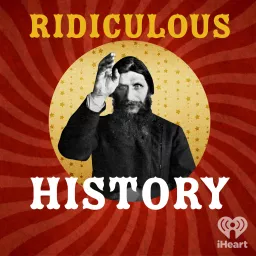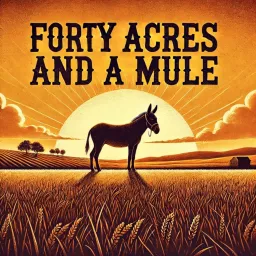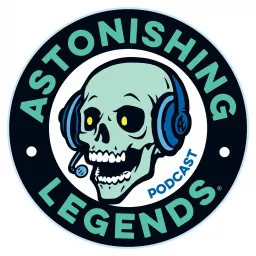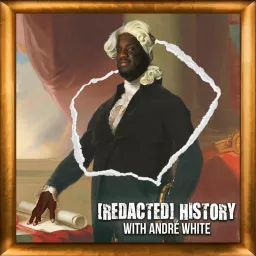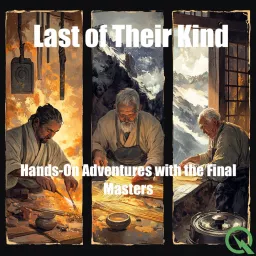Wyatt Earp - Audio Biography
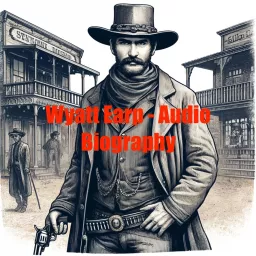
Wyatt Earp, born Wyatt Berry Stapp Earp on March 19, 1848, in Monmouth, Illinois, was a legendary figure of the American Old West. His life was a tapestry of adventure, law enforcement, and controversy, forever etching his name in the annals of American frontier history.
Wyatt was born to Nicholas Porter Earp and his second wife, Virginia Ann Cooksey. He was the fourth of eight children in the Earp household, which valued hard work, discipline, and a strong sense of justice. Growing up on the family farm, Wyatt learned the skills of hunting, shooting, and horsemanship, which would serve him well in his future endeavors.
In 1864, at the tender age of 16, Wyatt left home to make his own way in the world. He began his journey working as a teamster, transporting goods and supplies across the rugged frontier. This experience taught him the value of self-reliance and the importance of being able to handle oneself in dangerous situations.
As the American Civil War drew to a close, Wyatt returned home to Monmouth, where he married Urilla Sutherland in 1870. Tragedy struck just a few months later when Urilla died of typhoid fever, leaving Wyatt heartbroken. Seeking a fresh start, he set out for the West once more, this time with his brothers Virgil and Morgan.
The Earp brothers found themselves in the thriving cattle town of Wichita, Kansas, where Wyatt took on the role of a lawman. He served as a police officer and later as a deputy marshal, earning a reputation for his toughness and unwavering commitment to upholding the law. It was during this time that Wyatt honed his skills as a gunfighter, a talent that would become legendary in the years to come.
In 1876, Wyatt moved to Dodge City, Kansas, another bustling frontier town known for its rough-and-tumble atmosphere. Here, he continued his work as a lawman, serving as a deputy marshal and later as the city marshal. Along with his brothers and the famous gunslinger Bat Masterson, Wyatt helped to bring a measure of order to the wild streets of Dodge City.
It was in Dodge City that Wyatt met Doc Holliday, a dentist turned gambler and gunfighter. Despite their different backgrounds, the two men formed a close friendship that would last a lifetime. Together, they would face many challenges and battles, becoming one of the most famous partnerships in Western history.
In 1879, Wyatt and his brothers moved to the silver-mining boomtown of Tombstone, Arizona. It was here that Wyatt would face the greatest challenge of his life and cement his place in American legend. As the town marshal, Wyatt found himself at odds with a group of outlaws known as the "Cowboys," led by the notorious Clanton and McLaury brothers.
Tensions between the Earps and the Cowboys escalated, culminating in the famous gunfight at the O.K. Corral on October 26, 1881. Wyatt, along with his brothers Virgil and Morgan, and Doc Holliday, faced off against the Cowboys in a 30-second shootout that left three of the outlaws dead. The gunfight became a symbol of the struggle between law and order and the lawlessness of the frontier.
The aftermath of the O.K. Corral shootout was a time of great turmoil for Wyatt and his brothers. They faced legal challenges and personal attacks from the friends and allies of the slain Cowboys. In December 1881, Virgil Earp was ambushed and severely wounded, and in March 1882, Morgan Earp was killed in a similar attack.
Seeking justice for his brothers, Wyatt embarked on what became known as the "Earp Vendetta Ride." Along with a posse of loyal supporters, including Doc Holliday, Wyatt tracked down and killed several of the men responsible for the attacks on his family. This controversial period in Wyatt's life would later be the subject of much debate, with some viewing his actions as those of a vigilante, while others saw him as a man driven by a deep sense of honor and a desire for justice.
Following the Vendetta Ride, Wyatt left Arizona and spent the next several years moving from one boomtown to another, often working as a lawman or a gambler. He spent time in Colorado, Idaho, and Alaska, always seeking new opportunities and adventures. In the 1890s, Wyatt settled in California, where he became involved in the burgeoning film industry, serving as a consultant on early Western films.
As Wyatt entered his later years, he began to reflect on his life and legacy. He collaborated with biographer Stuart N. Lake to tell his story, which resulted in the 1931 book "Wyatt Earp: Frontier Marshal." Although the book was later criticized for its embellishments and inaccuracies, it played a significant role in shaping the public's perception of Wyatt Earp and the American West.
Wyatt Earp died on January 13, 1929, at the age of 80, in Los Angeles, California. He was cremated, and his ashes were buried in the Marcus family plot in Colma, California. In the decades following his death, Wyatt's legacy continued to grow, with numerous books, films, and television shows depicting his life and exploits.
Today, Wyatt Earp remains an iconic figure of the American West, embodying the qualities of courage, determination, and a fierce commitment to justice. His life story, with its mix of fact and legend, continues to captivate and inspire people around the world, serving as a reminder of the enduring power of the human spirit in the face of adversity.
However, it is important to recognize that Wyatt Earp's legacy is not without controversy. Some historians have argued that his reputation as a heroic lawman was largely a product of self-promotion and mythmaking, and that his actions, particularly during the Earp Vendetta Ride, were more those of a vigilante than a man of the law.
Others have pointed out that Wyatt's story is often told from a one-sided perspective, focusing on his accomplishments and brushing over his flaws and failings. Like many figures of the Old West, Wyatt Earp was a complex and multifaceted individual, shaped by the hardships and challenges of his time.
Despite these controversies, there is no denying the impact that Wyatt Earp had on the American imagination. His story, whether entirely true or embellished by legend, has become a symbol of the rugged individualism, courage, and determination that characterized the American frontier.
In many ways, Wyatt Earp's life serves as a microcosm of the larger story of the American West. It is a tale of adventure and hardship, of lawlessness and justice, of myth and reality. Through his experiences as a lawman, a gambler, and a adventurer, Wyatt Earp helped to shape the course of American history and left an indelible mark on the nation's cultural landscape.
As we continue to grapple with the complexities of our past and the challenges of our present, the story of Wyatt Earp remains as relevant as ever. It serves as a reminder of the enduring power of the human spirit, the importance of standing up for what is right, and the ongoing struggle to build a more just and equitable society.
In the end, Wyatt Earp's legacy is not just that of a man, but of an ideal. He represents the best of what we aspire to be as individuals and as a nation: courageous, determined, and uncompromising in the face of adversity. His story, with all its triumphs and tragedies, continues to inspire and challenge us, reminding us of the enduring power of the American dream.









